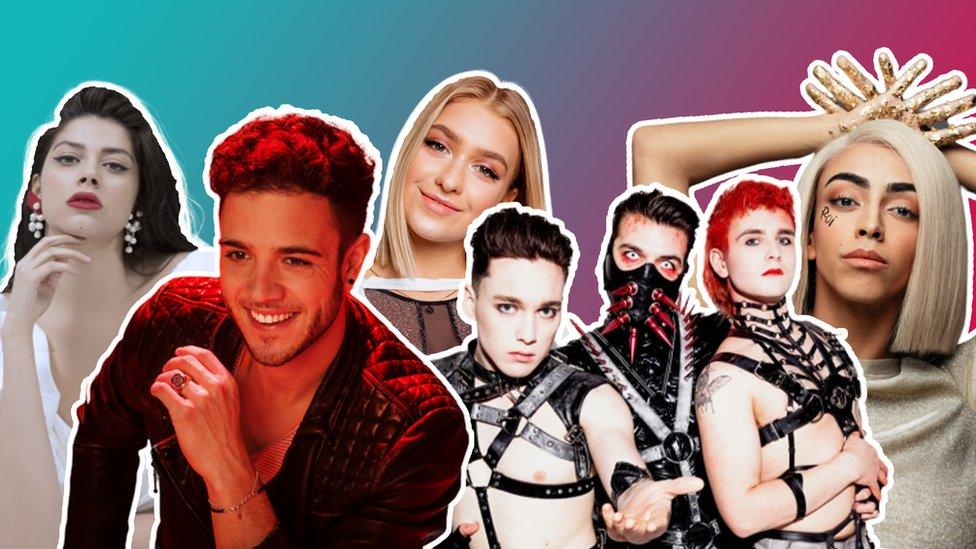Eurovision 2021: How this year's acts are aiming for a Covid-safe contest
- Published
Road to Rotterdam: Behind the scenes at Eurovision 2021
"This is a joint mission to entertain 200 million people watching at home."
For Norwegian singer TIX, this year's Eurovision Song Contest in Rotterdam is hugely symbolic considering what the world is going through.
"I think we all feel a sense of responsibility to everyone watching," he says.
It's a feeling echoed by many of the 39 acts competing at the world's most popular live music event, which is back after being cancelled last year.
Many of them - like the UK's James Newman - have been preparing for nearly two years for that make-or-break performance on the Eurovision stage.

The floor of the Rotterdam Ahoy Arena is where the countries' delegations will be sitting
Eurovision 2021 is one of the most high profile live events to take place in the pandemic so far, presenting a logistical challenge that has to balance public safety with the desire for entertainment.
A full-scale show was ruled out earlier this year but "cancelling again was never a consideration" according to Martin Österdahl, Eurovision's executive supervisor.
"It's all a part of getting back to normal. We always said no matter what happens with the pandemic we will have a song contest."
Eurovision's green light meant a second shot for many of last year's acts. Of the 39 countries taking part, 26 have re-selected their 2020 entry.
"As soon as it was cancelled, I wanted to do it again," James Newman tells Radio 1 Newsbeat.
"I was having such a good time last year and my end game was always getting on that stage in front of all those people."
Everyone's had to write a brand new song and James says his track Embers is a metaphor for the contest.
"The sparks don't die out and people come back together."
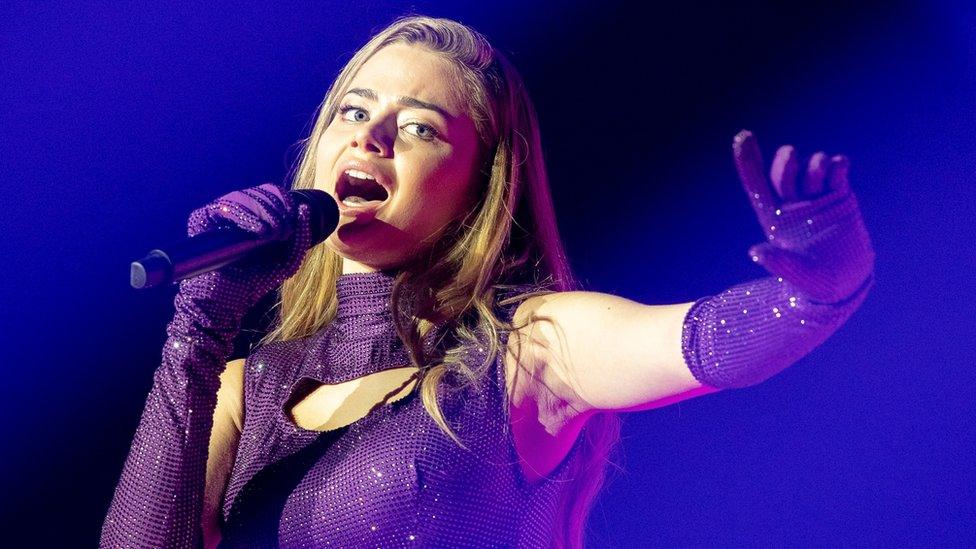
Competing for Greece, 18-year-old Stefania is the youngest competitor - but lives in the Netherlands
Most of the acts have been in Rotterdam rehearsing for more than a week and they're following strict guidelines to avoid a Covid outbreak.
Countries are in so-called delegation bubbles and aren't allowed to mix with anyone outside them.
"Me and my team test each other every day," says Greece's entry Stefania.
"We're really careful with each other. Everyone keeps their distance and respects each other's choices. I don't hug anyone."
The same goes for Vasil, representing North Macedonia, who's completely stayed away from people.
"I need to get on that stage."
Flo Rida: 'I would love to go to Eurovision.'
At the venue, Rotterdam's Ahoy Arena, strict controls are in place and everyone on site has to get tested every 48 hours.
Those safety protocols were put into action when a member of both the Polish and Icelandic delegations (who are staying in the same hotel) went into isolation after testing positive for Covid-19.
Subsequently, the rest of their teams had to quarantine as they wait for their own PCR test results.
As a precaution, the Maltese and Romanian delegations - also staying in the same hotel - avoided an opening ceremony event in the city.
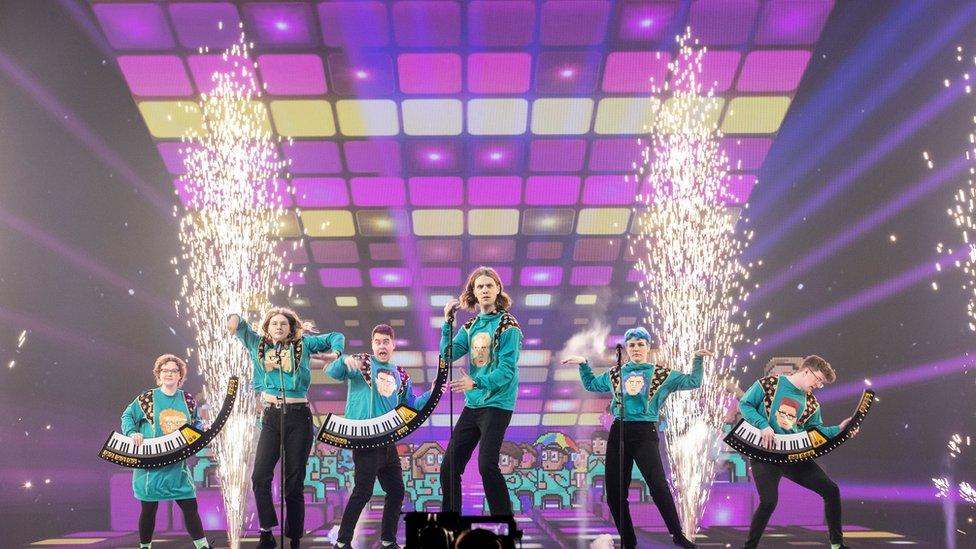
Daði Freyr (centre) has built his own Eurovision empire which includes video games, costumes and virtual reality concerts
Before news of the positive case came through, Iceland's Daði Freyr spoke to us about his return to the contest with his supergroup Gagnamagnið.
Daði's song, 10 Years, is a tribute to his wife, and although it doesn't deviate too much from his 2020 entry Think About Things, his DIY attitude to Eurovision and unique style has got him thousands of fans.
"Our approach to Eurovision is more is more," says Daði, who's hoping to get to the contest's grand final on 22 May.
"We try to squeeze anything that's classic Eurovision into our performance. All of the lights, all of the colours, all of the pyro... and all of the sassiness."
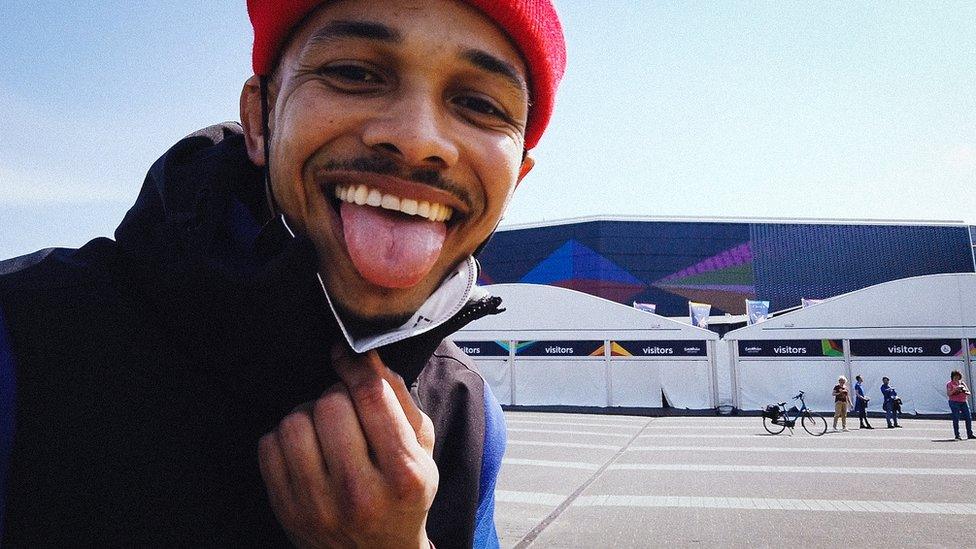
Former snowboarder Benny Cristo is competing in the second semi-final
After a negative result at the event's testing site, Czech Republic's Benny Cristo screams "let's get this done!"
He's travelled to the contest with his delegation on a bus from Prague which "didn't even stop at gas stations" so they could stay "super safe".
He also quarantined for two weeks before travelling. "Just being here is already a blessing," he tells us.
"It's a huge honour for me... It's like the biggest thank you I can give": Meet Sweden's Eurovision act Tusse
Journalists have to follow strict controls too - wearing masks when not at desks and making sure all interviews are socially distanced.
Usually Eurovision is full of mini concerts, parties and events but this time the artists spend most of their time in their hotel rooms.
It's where Destiny, who's representing Malta with empowerment anthem Je Me Casse, has been warming up her powerful vocals.
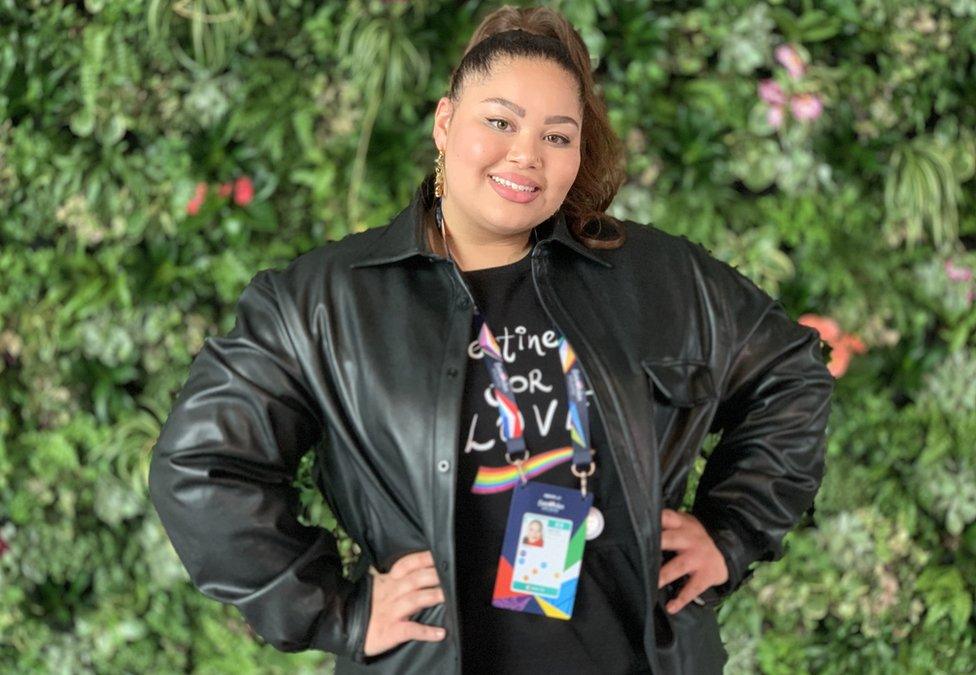
Destiny won the Junior Eurovision Song Contest in 2015 and wants to be the first person to do the double by winning the main event too
"I was actually asking my vocal coach whether I'd be annoying people in the hotel because I was doing my voice exercises over and over again. But it's what we need to do."
She says Eurovision organisers have "made it very clear that we have to obey the rules" and all delegations have to get pre-arranged buses between their hotels and the venue.
If you want to know her idols? Lizzo, Beyonce and Aretha Franklin. "They bring the ooomph", she says.
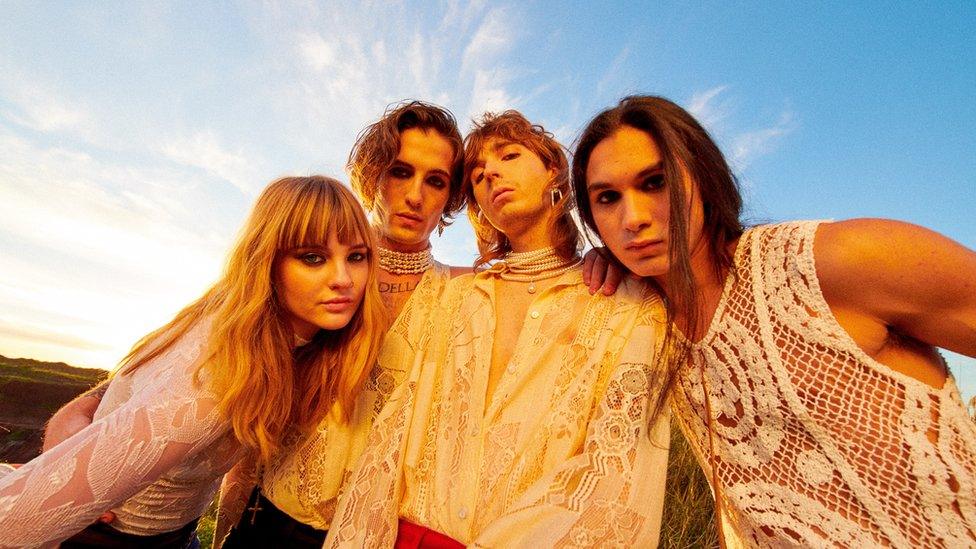
Italy's rock group Måneskin have seemingly brought their country's entire supply of pyrotechnics to Eurovision 2021
Coronavirus has affected every artist differently but it's clear Eurovision is going to be a huge moment for the live events industry.
Germany's Jendrik was a theatre actor who found himself completely out of work and others - like Italy's rock band Måneskin - haven't played a show in well over a year.
The Dutch government has allowed a maximum of 3,500 people to watch each of the semi-finals and grand final.
"It's the first time we've got the opportunity to play such a big event. We can't wait to get back in front of an audience for the first time," says the group's Victoria De Angelis.
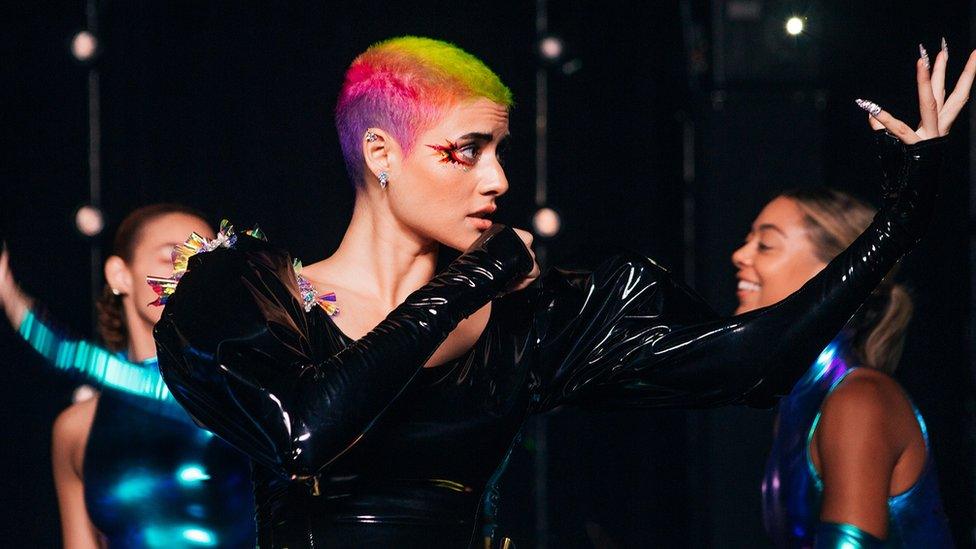
Australia's Montaigne was originally selected via a TV selection show at the beginning of 2020
As part of the measures to keep everyone Covid-safe, every country has filmed a back-up performance, which can be used in case of emergency.
It's what Australia will be using on the night, because travel restrictions mean singer Montaigne can't get to Rotterdam.
She was originally selected for 2020 and says it's "two out of two times" she's not been able to physically touch the Eurovision stage.
"I've accepted it now. It's not ideal for the competition but I'm proud of the song and people get to see it performed, just in a different way."
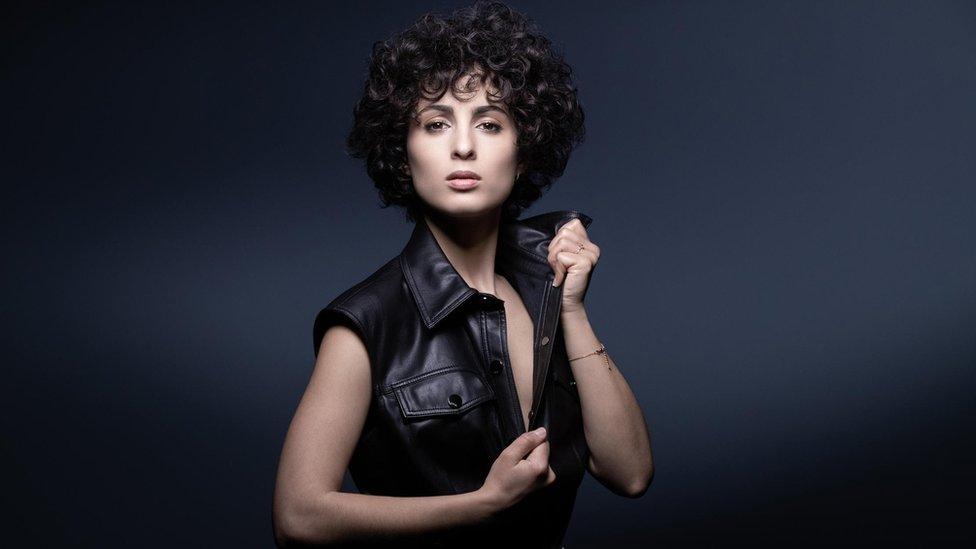
Close your eyes when you listen and Barbara Pravi's song and you'll imagine sipping a coffee on the streets of Paris
"Because of Covid it's hard to practice music," says France's entry Barbara Pravi.
"We don't have shows and it's hard to put your song online when so many other artists are doing the same. Participating at Eurovision is a huge chance for me."
There's lots of hype around her entry - Voila - which is currently one of the favourites to win.
Pravi calls it a typical "chanson Francaise" filled with lyrics that reflect "hope and affirmation about yourself".
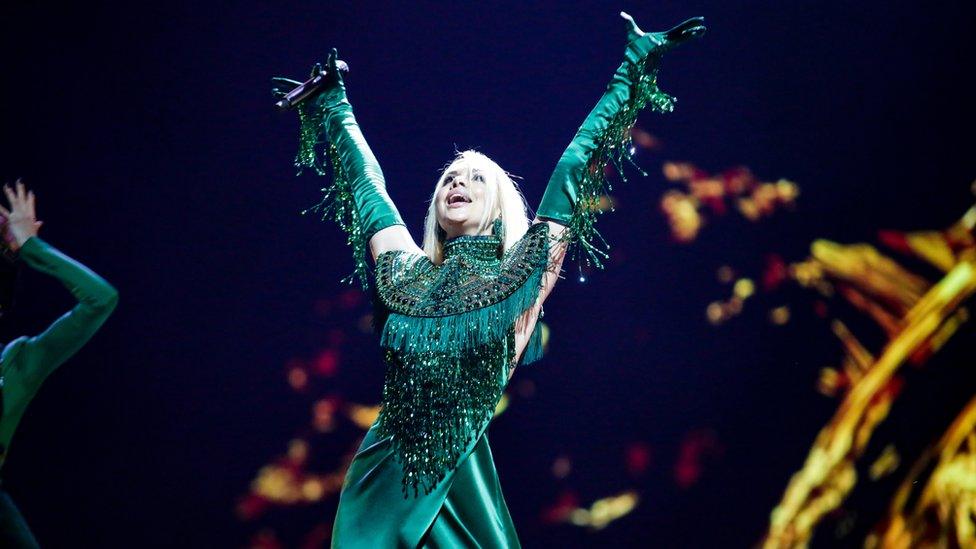
Latvia's Samanta Tina not only wrote and produced her song, but directed the music video too
Others have been waiting years for their chance at Eurovision, including Latvia's Samanta Tina who entered her national selection competition five times.
She finally won on her sixth attempt, before seeing the chance snatched away when the contest was cancelled.
"If I can't change the situation, I can learn to change my attitude to that situation. I have a huge responsibility," she says, as she returns with a new song for 2021.
Similarly, Uku Suviste from Estonia has been submitting songs to his national selection since 2005 and Azerbaijan's Efendi applied six times.
"If you keep knocking on a door it will eventually open," says Efendi.
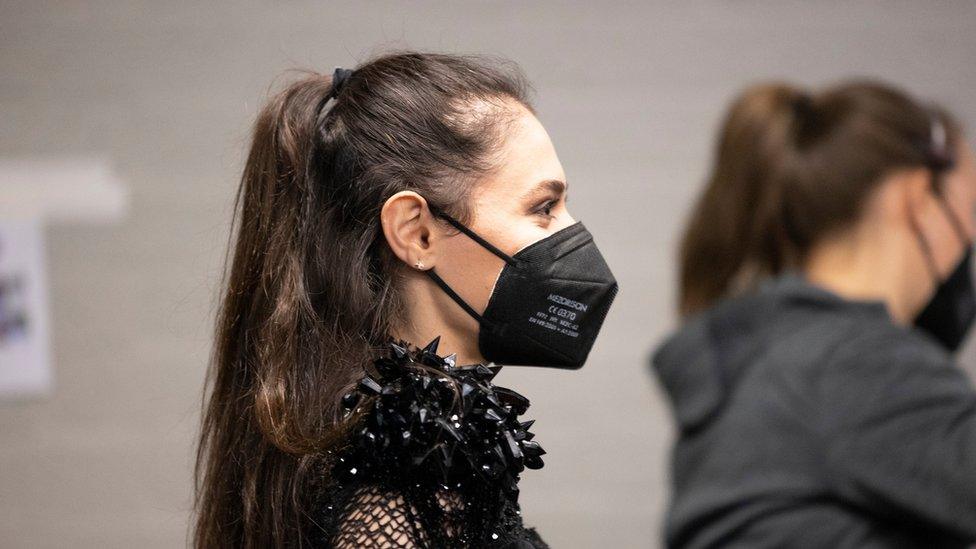
Backstage, the contestants, like Azerbaijan's Efendi, are required to wear masks in certain areas
For some of those returning, the challenge was to come up with a new song they felt was better than their previous one.
Bulgaria's Victoria was a favourite to win last year with her entry Tears Getting Sober but she found herself comparing all her new tracks and "thinking that everything was awful."
In the end, she returned to an unfinished demo from 2019 which she's turned into a track about her childhood and her love for her dad.
As a self-confessed introvert, she admits enjoying the first few months of lockdown before she realised how much she'd been missing people.
"I want to go out. I want to be happy and I want to be free."
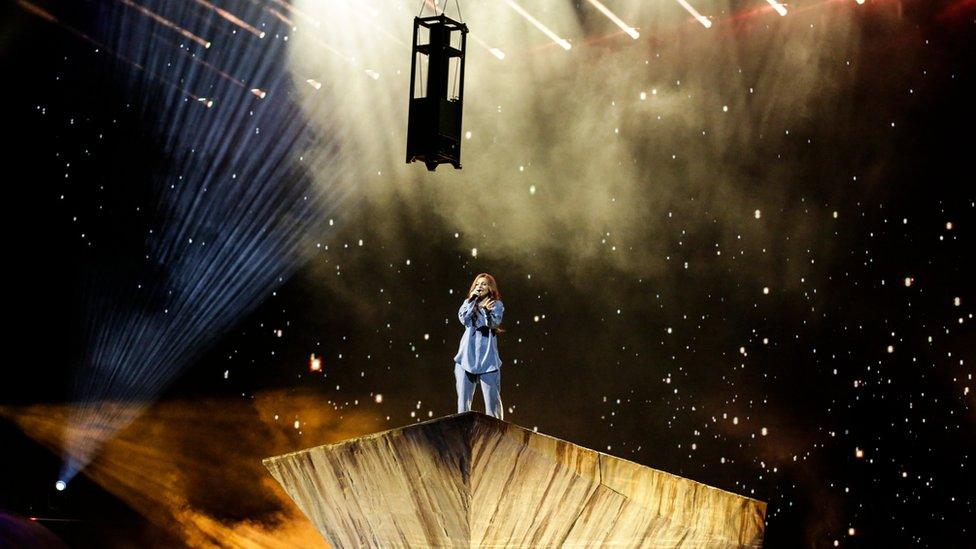
Stepping on to the Eurovision stage for the first time, Victoria says she had tears in her eyes
When Ireland's Lesley Roy found out she'd been selected to come back, she also felt she was trying too hard to get the perfect Eurovision song.
"I pulled away from the writing and thought that it needed to come naturally and when it's not forced.
"That was the lightbulb moment for me. I wrote about the search for the song and feeling lost. It was about finding the connection to yourself. And then the song, Maps, was easy."
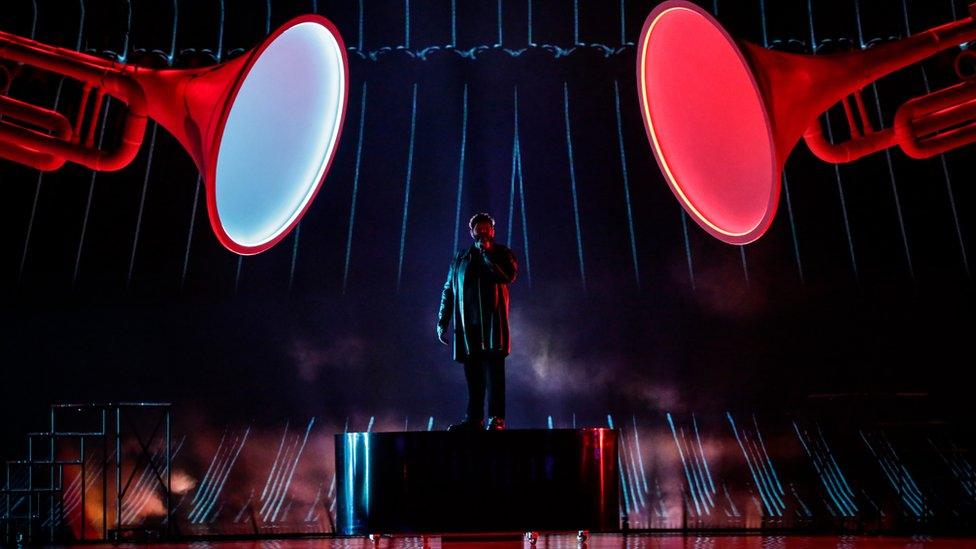
James will have several rehearsals during his time at Eurovision.
Back at the Eurovision arena, James Newman gets ready for his first rehearsal - and the first time he'll step onto the Eurovision stage.
He has three run-throughs of his song to practice vocals, choreography and get used to the staging. He's joined on stage by four dancers and two huge trumpets which hang from the ceiling.
After the performances he cools down in the corridor outside: "When I was standing there, the stage went pitch black and I thought 'oh my gosh, this is actually happening'.
"I got a good vibe in soundcheck and I just need to convey that to the audience at home.
"Bring on the grand final!"
More stories from the world's favourite song contest:


Follow Newsbeat on Instagram, external, Facebook, external, Twitter, external and YouTube, external.
Listen to Newsbeat live at 12:45 and 17:45 weekdays - or listen back here.
Related topics
- Cyprus
- Austria
- Republic of Ireland
- North Macedonia
- Azerbaijan
- Israel
- Spain
- France
- Coronavirus lockdown measures
- Belarus
- Greece
- Slovenia
- Travel
- Germany
- Sweden
- Denmark
- Serbia
- Rotterdam
- Russia
- Portugal
- Eurovision Song Contest
- Lithuania
- Latvia
- Singing
- Norway
- Georgia
- Estonia
- San Marino
- Moldova
- Romania
- Albania
- Self-isolation
- Italy
- Bulgaria
- Finland
- Czech Republic
- Armenia
- Netherlands
- Croatia
- Malta
- Ukraine
- Iceland
- Poland
- Coronavirus
- Switzerland
- Music
- Belgium
- Australia
- Published11 May 2020
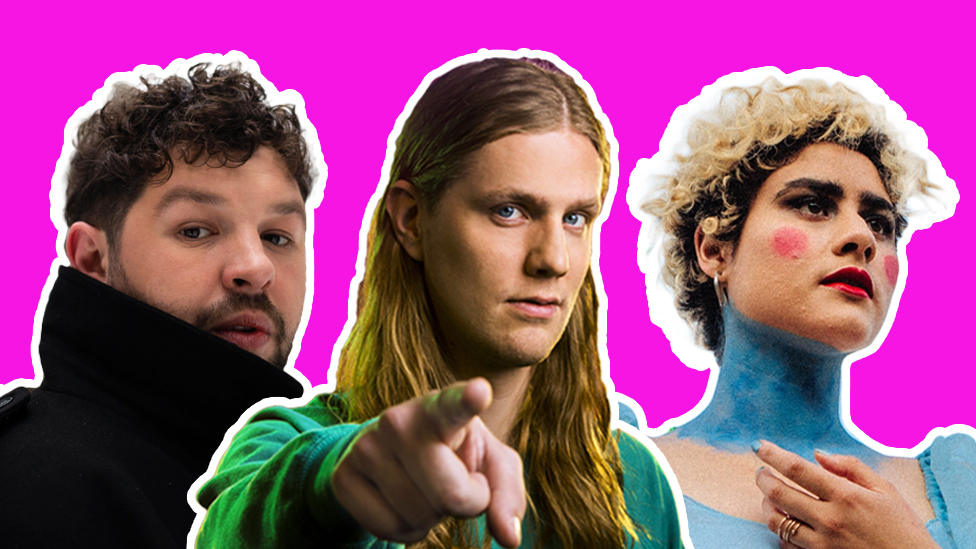
- Published7 March 2020
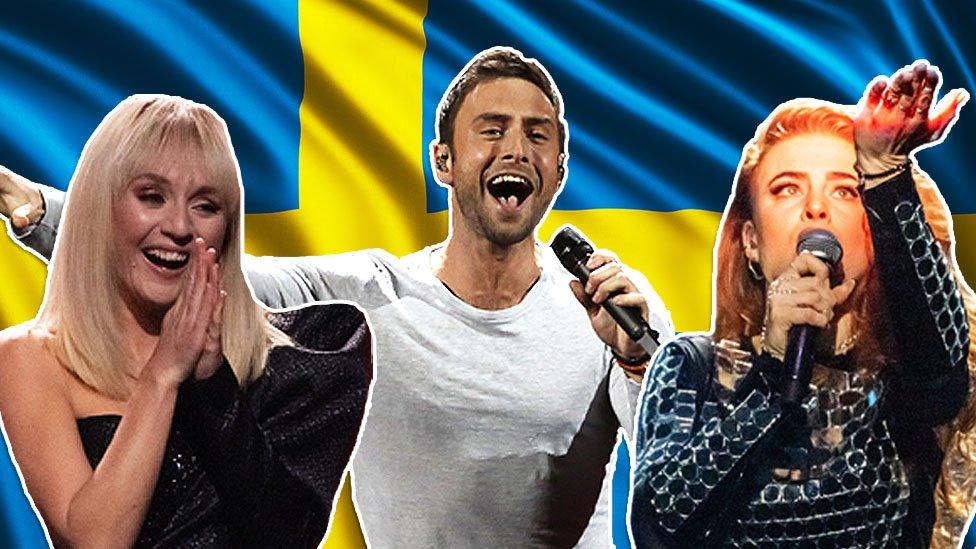
- Published12 May 2019
